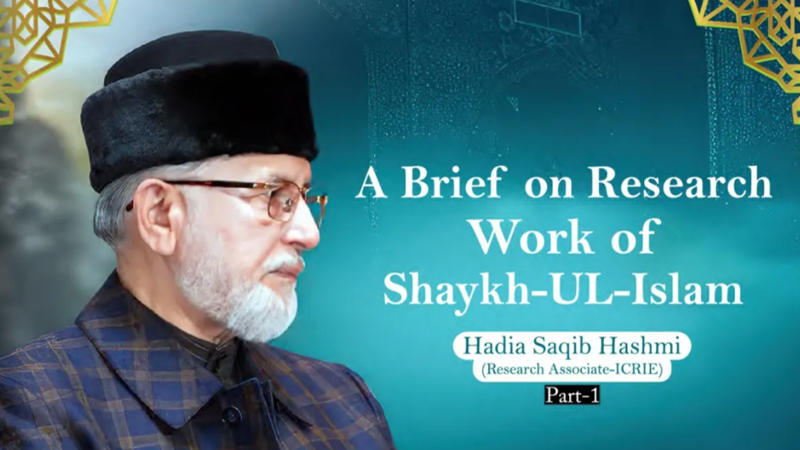Shaykh-ul-Islam Dr. Muhammad Tahir ul Qadri, founder of Minhaj ul Qur'an, is a Pakistani Islamic scholar known for his extensive work in various fields. His contributions include efforts to promote peace, interfaith dialogue, and education. He has authored numerous books on Islamic jurisprudence, spirituality, and Sufism, aiming to bridge the gap between traditional Islamic teachings and contemporary issues.
Shaykh-ul-Islam stands as a prominent figure in the Islamic world, renowned for his multifaceted contributions as the founder of Minhaj ul Qur'an. Born into a scholarly family, Shaykh-ul-Islam’s journey unfolded with a deep commitment to promoting a nuanced understanding of Islam. The establishment of Minhaj ul Qur'an marked the beginning of a transformative mission that spanned Islamic scholarship, peace promotion, education, and social welfare.
Through a myriad of written works, he has delved into Islamic jurisprudence, spirituality, and Sufism, seeking to bridge the gap between traditional teachings and contemporary challenges. His publications serve as pillars, shaping a discourse that not only enriches Islamic thought but also addresses the complexities of the modern world.
Shaykh-ul-Islam has authored 1,000 books in Urdu, English and Arabic languages. About 640 of these books have been published so far. His works have also been translated in many languages of the world. His revivalist, reformative and reconstructive efforts bear historic significance and hold an unparalleled position in promoting the cause of world peace and human rights, propagating the true Islamic faith and teachings of the Quran and Sunna.
Work on Sufism
One of his most significant contributions is his detailed research on Sufism, where he has expounded upon the spiritual and mystical aspects of Islam. His works in this area aim to revive the true essence of Sufism, emphasizing the balance between inner spiritual development and adherence to Islamic law. Shaykh-ul-Islam’s approach to Sufism is both traditional and contemporary, making it relevant and accessible to a modern audience.
Work on Islamic Jurisprudence
In the field of Islamic jurisprudence, Shaykh ul Islam's research is notable for its depth and practical application. He has authored numerous books and articles addressing various aspects of Islamic law, ranging from family law to financial transactions. His work is characterized by its adherence to the principles of the Quran and Sunnah, while also taking into account the challenges and needs of contemporary society. This pragmatic approach has made his work particularly influential among Islamic scholars and practitioners alike.
Work on Combatting Extremism and Terrorism
Shaykh ul Islam's commitment to combating extremism and promoting peace is evident in his scholarly work on anti-terrorism. He has written extensively on the Islamic perspective on terrorism, strongly condemning violence and extremism in the name of religion. His 600-page Fatwa against terrorism and suicide bombing is a landmark document that provides a detailed theological and jurisprudential argument against the misuse of Islamic teachings for violent ends. This fatwa has been recognized globally for its comprehensive analysis and firm stance against extremism.
Work on Interfaith Dialogue
Interfaith dialogue is another area where Shaykh-ul-Islam has made substantial contributions. He believes in the importance of understanding and respect between different religious communities. His work in this field involves engaging with leaders and scholars from various faith traditions, promoting mutual respect, and understanding. His efforts aim to dispel misconceptions about Islam and build bridges between different communities, fostering a culture of peace and coexistence.
Educational and Social Reforms
Education and social reform are central to Shaykh-ul-Islam’s mission. He founded Minhaj-ul-Quran International, an organization dedicated to promoting Islamic learning, spirituality, and social welfare. Through this organization, he has established educational institutions, including schools and colleges, that provide religious and contemporary education. These institutions aim to nurture a well-rounded understanding of Islam, equipping students to contribute positively to their societies.
Shaykh-ul-Islam’s influence extends to the political sphere, where he has been a vocal advocate for democracy and good governance. His political activism is driven by the principles of Islamic justice and the need for ethical leadership. He has organized and led mass protests against corruption and for electoral reforms in Pakistan. His political endeavors are seen as an extension of his broader mission to establish a society based on Islamic principles of justice and welfare.
Shaykh-ul-Islam’s scholarly work is also notable for its accessibility. He has utilized various media platforms to disseminate his teachings, reaching a wide audience. His lectures and sermons are available online, making them accessible to people worldwide. This approach has been particularly effective in engaging the youth, who are often disconnected from traditional religious institutions.
Work on Aqaid (Islamic Beliefs)
Shaykh-ul-Islam’s scholarly work on Aqaid (Islamic beliefs or faiths) is an essential contribution to Islamic theology, addressing the core principles and tenets of Islamic faith. In his exploration of Aqaid, Shaykh-ul-Islam delves deep into the fundamental beliefs of Islam, such as the oneness of God (Tawhid), Prophethood (Nubuwwah), the Day of Judgment, and the importance of the Quran and Sunnah as primary sources of Islamic law and guidance. His approach is both comprehensive and inclusive, acknowledging the diversity within Islamic thought while emphasizing the unity and coherence of its central doctrines. By elucidating these principles in a manner that is accessible to a contemporary audience, Shaykh-ul-Islam not only educates Muslims about their own faith but also provides valuable insights for interfaith dialogue and understanding. His work in this area is particularly crucial in a global context where misunderstandings about Islamic beliefs are common, and it serves as a bridge to foster greater understanding and tolerance among different communities.
Humanitarian Efforts
In addition to his scholarly and political work, Shaykh-ul-Islam has been instrumental in humanitarian efforts. Through Minhaj Welfare Foundation, the charity wing of Minhaj-ul-Quran International, he has initiated various social welfare and development projects. These projects include healthcare, education, emergency relief, and sustainable development initiatives, particularly in underprivileged areas of Pakistan and other countries. The Foundation's work is a practical manifestation of Shaykh-ul-Islam’s vision of an Islam that is deeply engaged with the well-being of the community. By addressing issues such as poverty, education, and health, the Foundation seeks to improve the quality of life for the less fortunate, reflecting the Islamic values of compassion and service to humanity.
Shaykh-ul-Islam’s approach to Islamic scholarship is also characterized by its inclusivity and focus on the empowerment of women in Muslim societies. He advocates for women's rights and their active participation in all spheres of life, including religious scholarship. His teachings emphasize the importance of women's education and their role in shaping a just and balanced society. This stance has been influential in challenging traditional narratives that often marginalize women's roles in Islamic contexts.
The international reach of Shaykh-ul-Islam’s work is a testament to his impact as a global Islamic scholar. He has delivered lectures and participated in conferences around the world, engaging with diverse audiences on issues related to Islam, peace, and interfaith harmony. His message transcends cultural and geographical boundaries, resonating with people from different backgrounds and beliefs. This global perspective is a crucial aspect of his work, as it reflects the universal values and principles that he espouses.


